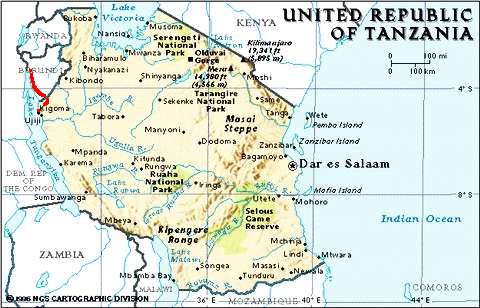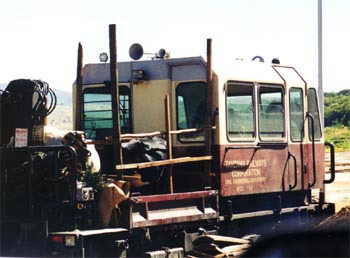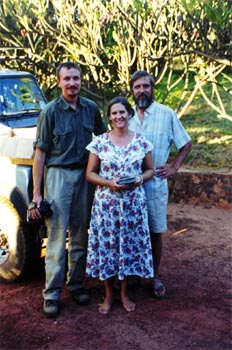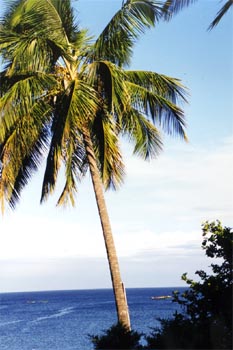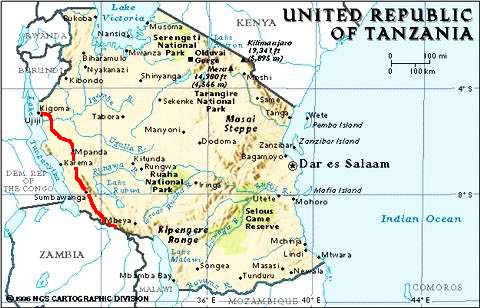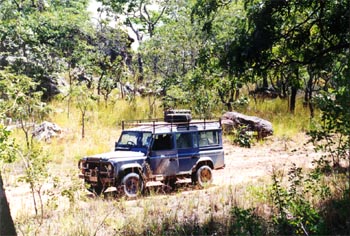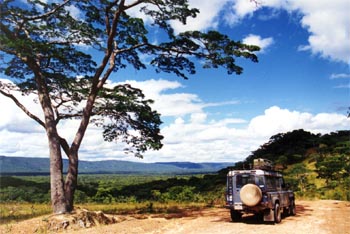
. . . LAND ROVER OVERLAND EXPEDITION
| Home | |
|
Journals
|
|
|
VALUED SPONSOR |
|
To the Congo and the Worst Road in
Africa The congregation beamed applause and laughter and
joy and life � and I thought, how will the first world achieve the
satisfaction and joy of this place? Africa the paradox. I think when you find sanctuary you
develop feelings for a place. Bujumbura was our cocoon of comfort after
the trials of the Burundi highlands and we loved her. We felt as though
danger was behind us and lolled in Buja�s urban delights. Shops of cheeses,
good food, movies in dubbed French, walks through the market, and lots
of souvenirs. Swahili was spoken so I was back in form. Our two days
fled by and we headed south for Kigoma reluctantly. Leaving
Burundi the Hard Way Kevin got out to look around. I though
about our options. We were bound for Kigoma and had picked the most direct
route. I didn�t know of any official tension between the two countries,
and a re-route to a larger border post would add four hours to our trip.
Only a flimsy steel barrier stood between us and Tanzania. There was
a narrow bicycle path to the left of the barrier bordered by four-foot
mounds of dirt. Hmmm, I wonder� Kevin wasn�t finding anyone. I edged
forward into the path with the left wheels riding way up onto the mound,
the right window tipped over within inches of the barrier as the truck
tilted past thirty degrees. Land Rover added massive coil springs to
the Defender with almost two feet of travel, and they sucked up the dirt
mounds impassively. No problem. We were in no mans land without permission � again. Kevin looked out from the building
and noticed that the truck was suddenly on the other side of the barrier.
Almost simultaneously a cyclist appeared pedaling madly toward us. We
both knew that crossing the barrier without authorization would mean
nasty questions. He started toward the truck trying not to run and draw
attention. The cyclist closed rapidly. Engine revving, we jumped away
as Kevin stepped on the running board, twisting into the narrow forested
connecting track and out of sight. We were through. I followed an old set of tire tracks
for no real reason while we evaluated our predicament. We had gotten
out of Burundi but if the border was closed, how would we get into Tanzania?
We reached the opposite border post, a brief friendly chat in Swahili
with the soldier at the gate (�Oh no we�re not Americans, we�re CANADIANS�)
and we were through. A full complement of the clerks and officials were
sitting patiently at their desks - Customs, Immigration, Police, and
Tax � and processed us through with the normal amount of graft and hassle.
Nobody on the Burundi side � situation normal on the Tanzania side. Classically
African. We found out later that the border
had been closed and mined. The doctor in Kigoma regularly treated casualties
of the mines and it was considered a highly dangerous zone. If I hadn't
followed those tire tracks exactly through the no man's land... Attempting
to Enter Congo's War Zone Transportation was limited to freight
boats. Forty feet long and twelve feet wide, open to the elements, capable
of carrying twenty tons, powered by a single outboard motor - definitely
the slow steady mode of transportation. The trip would take a full day
and night but the weather was good and the price was right. �Come back
Monday� we were told. A weekend to recuperate and refresh. No problem. The Millers had us over for iced
tea and cake while we checked our e-mail. I remembered visiting that
very mission station when I was fourteen years old. Dad and I rode the
SNCZ tug in a snug cabin while the diesel engine rumbled me to sleep.
Kigoma was nicer, better roads, cleaner buildings, fifteen years less
decayed. And yet, the sense of isolation was almost absolute. We existed
at the edge of the world where correspondence lessons took a year to
get graded by Canada based teachers and the best thing to send us was
Kool-Aid because it didn�t go bad. Home was months away. Friends got
tired of waiting months for replies to their letters and stopped writing.
We ate with out hands. Now I checked e-mail that was hours old and sent
messages that took seconds to reach their destination. It was sad in
a way. Kigoma was no longer a different dimension, it was simply a crumbling
backwater. Africa as a whole seemed to transform
that way before my eyes. Destinations were stripped of their mystique.
Apply the measure of civilization without isolation � the balance tips � the
measure is lacking. A deficit of such appalling magnitude that it almost
always results in despair. How will these people find their way? How
can such a morass achieve the order of the first world? I attended a
service on Sunday to ordain three new pastors. It started an hour late
and ran two enthusiastic hours past schedule. Choirs sang, prayers were
prayed, certificates presented, prayers, beaming wives and kids, �And
now the visiting pastor from Kilala will pray�, photos, gruff questioning
from the elder teacher of the Bible school, ��and now the pastor from
Kongolulu��, and the congregation beamed applause and laughter and joy
and life � and I thought, how will the first world achieve the satisfaction
and joy of this place? Africa the paradox. We packed our bags on Monday and
headed for the sand beach terminus of the freighter canoes. Nothing.
Come back tomorrow. David drove us to Kijiji past the famous site where
Stanley found Livingstone (�Dr. Livingstone I presume�) to find other
transport� nothing. Finally Lewis, one of the recently ordained pastors,
offered to look around and find something for us. We headed back to our
hotel to wait some more. The next day � nothing. The only way would be
to hire a boat and pay for the crew to stay and eat in Congo while we
visited � plus all the bribes on the Congo side � estimated cost of $800US.
Too much. We�d been told of mzungus (white men) who were taken out on
the lake and killed for their belongings. I realized that the guardian
angels might be going on strike and decided not to push my luck. Kevin
and I tried to find a ride with the UN High Commission for Refugees.
They had a big local base to handle the massive influx of refugees from
the Congo fighting. No luck. Finally we decided to press on. Kigoma had been a good break and
we�d met most of the local missionary community. It was as close to my
old home as I would get on this trip, but in a way I was glad that Kalemie
wouldn�t be stripped of it�s mystique. It was a bad time and the old
city wouldn�t look her best. We�d made friends and handed out most of
the tapes/CDs that we�d brought. It was time to brave 'the most desolate
road in Africa'. Like the rest of the Land
Rover Defender 110, the trailer hitch is designed with good old English
over-engineering � not
very ergonomic but plenty beefy. Two eight inch squares of � inch steel
are bolted to the chassis and hang down six inches, the trailer hitch
is bolted at the bottom of the plates and the whole mass of steel is
reinforced by two reinforcing bars that angle back under the truck. It�s
designed to haul massive trailers through terrible conditions so it has
to be way overbuilt. But by the time we scrambled clear of Tanzania�s
roads, the rebars were sheared off and the two metal plates had been
folded like cardboard! Tanzania Isolation Lack of rain was good because we
didn�t have the knobby tires to get through the worst of the mud, but
the dry dust was like talcum powder and it poured into the windows relentlessly.
Branches whipped past the windows and deposited leaves, seeds, bugs,
and thorns into our laps. We came to an old one-lane cement bridge and
something seemed to be blocking the right side. Kevin inched forward.
The cement had been damaged in some forgotten accident and erosion had
taken a two-foot bite out of the side. There was no way to cross so someone
had thrown down an old piece of steel plating� unfortunately years of
heavy lorries had bent the plate and it looked in danger of popping through
the gap into the river far below. We examined the plate uneasily. A pickup
rumbled around the corner and inched up behind us obviously waiting to
go over. Well, if he could do it� Kevin drove slowly over, the plate
groaned; we bounced back up onto the bridge. Kev was a bit pale and I
was jovial, �How do you like that! Now that�s a bridge! Why when I was
a kid we�d drive over bridges worse than that all the time. You haven�t
seen nothing yet.� I had no idea how right I was. The road suddenly got a lot worse,
interesting, I switched back into the driver�s seat. This was obviously
where traffic left off. On the Tanzania side of Lake Tanganika there
is a dusting of civilization in the north, but the further south you
go, the more deserted it becomes. This had been the home of several rebel
groups over the years. Laurent Kabila had sheltered here on and off till
he got the support of the Tutsi in the north and swept Mobutu out of
power in Congo to become president. Here also sheltered a few Intrahwame
killers, the butchers of Rwanda now ostracised by their country with
it�s new government. Refugees from the current Congo war sheltered on
the shore a dozen kilometres from the road, till freight canoes trundled
past. The UN High Commission for Refugees pays a pick-up fee for every
refugee rescued by boat captains � an incentive for them to do the right
thing and bring the starving families to the camps. Local game had been
occasionally machine gunned by soldiers or killed by desperate travellers,
but there was precious little human habitation. Eerie. Bits
of History It was a close thing, but in the
end their hand was tipped off when Emin Pasha got into trouble and was
rescued by Henry Stanley (you remember him, �Dr. Livingstone I presume�).
Stanley was a big hero after the first adventure and received all kinds
of awards and generally got a swelled head � but he did know how to put
together an expedition. So when the mysterious Emin Pasha got into trouble
he went off on what turned out to be his second great adventure. Turned
out that this Pasha guy who was so mysterious to the natives was actually
Schlessinger, a Swiss national working for the Germans! So the English
parliament hummed and hawed and the great scramble for East Africa was
on. England took Kenya and Uganda and Germany was left with Tanzania. Still it wasn�t a bad deal because
Tanzania is quite large with varied temperate zones. And then the cruellest
irony of all, when the colonists went in they found out that the majority
of the country � literally millions of acres � were unfarmable or occupied
by the Tetse fly. That meant no cattle or farms, and no settlements meant
no development. Only recently have detailed surveys revealed large-scale
exploitable mineral resources, but their lure was missed a hundred years
ago because of bad weather and the insidious Teste fly and to this day
Tanzania remains one of the poorest countries in Africa. Bumping and banging over miles of
empty road left plenty of time for reflection, but we soon realized why
the settlers stayed away. I can vouch from personal experience that the
Tetse bite is not nice. They slice off a section of skin and sip the
blood that wells up, and for an encore there is a chance of dying from
the fly borne "sleeping sickness". Wild animals are immune
to the disease but it has a devastating effect on cattle. To avoid them
we needed to keep moving quickly � well, any excuse to drive fast. Roughest
Living Filled up with more $1/litre gas
(that�s $1.40/litre for you Canadians), and headed back into the fray.
The road crossed through a protected area, which meant slightly smoother
riding for awhile, but the Tetse flies came on thick and fast. Kevin
laid into the intruders with a computer programming book he�d brought
along � how�s that for de-bugging? Fly carcasses were smeared on the
windshield and passenger windows, and we left them there as a warning
to their friends. You enter this truck at your own risk you little *#%&!#�s.
Leaving the park we dove down an escarpment. Ancient road engineers had
dug regular drainage culverts, which had long since collapsed leaving
vicious invisible speed dips. Oddly enough it was smoother to accelerate
sharply and jump them at 60kph � until they got wider, and wham! Plastered
into the far edge. In the game of driving there are two ways to lose
points; you bottom the suspension, or you �toss the cookies� (all the
contents of the rear are flung into the air and come crashing back down).
It was a bad day for points. No combination of slow or fast was enough.
The back of the truck began to look like the inside of a washing machine.
We kept stuffing items back as they flew forward. Then the really interesting stuff.
Huge washouts that literally swallowed the whole truck. So steep that
we went straight down in, and scraped the tail on the way out hacking
grooves in the road with the trailer hitch. Kevin came to a washout on
a cliffside road. Water had eaten away the left side of the road so the
truck could not fit past. There were a few branches thrown across the
crack but not enough to support a heavy Land Rover. Our stomachs were
in our throats as we drove over, hanging a wheel into hundreds of feet
of thin air. Suddenly a paved road and a major
town. Oh joy, the rest of the way must be paved! Lunch and a thorough
cleaning of the back; jam jars were smashed, water leakage, my copy of
the Stone Diaries was a write-off, dust coated everything. We forced
down some rubber chicken and set off - tragedy, the paved road lasted
a few clicks and we're back to dirt. Back
into Zambia Stranded again in Nakonde. On the
way up I'd slept in the bush to avoid the "dangerous" town,
and had subsequently been arrested by the police for unauthorized camping.
It seemed Nakonde was my Waterloo. But after some consideration we realized
it was probably the best possible ending. The truck was being guarded
by a zealous soldier with a machine gun and we were free to walk to a
guesthouse for the night. Dinner improved our disposition and our leaky
shower (leaky is too generous, I should say gushing shower) made us feel
like we were falling asleep in the rain. I hate to leave a bad impression
of Tanzania even though we were elated to be off the roads. In retrospect
it has been my favourite country on the trip so far. Incredibly diverse;
from the cool heights of Kilimanjaro to the ancient mystery of Zanzibar,
the splendour of Ngorongoro and the vastness of Serengeti, the lush southern
highlands and the rugged isolation of the south-west - it was a splendid
and unexpected country. Still very poor, the government is working hard
to turn a corner on corruption and responding to the needs of it's citizens.
It's a peaceful country with no history of civil war and a population
that is generally quite friendly. And of course it helped that
I could speak Swahili to everyone we met. We shot out of Nakonde heading south
across the length of Zambia. Down the highlands, sweet-talked through
a police shakedown, siphoned petrol, and feasted on a junk food dinner
at Shell. The fluorescent lights and new gas pumps kinda made us want
to just sit there for awhile dreaming of credit card payment and Hostess
potato chips. Lusaka is considered a highly dangerous
city and tourists are warned to avoid Cairo Street, the main drag patrolled
by pickpockets, scam artists, and thieves. I�d kept the door locked when
I drove through going north, but after the mean streets of Kigoma and
ambush in Burundi we barely noticed the danger. Kevin and I strolled
down the street taking in the sights. It�s wasn�t that we were unaware.
More that we were hyper aware and spotted trouble well in advance � avoiding
it with inscrutable stares and flinty glances that told the scoundrels
we were not to be messed with. A quick cup of coffee (go to Vasilis on
Cairo � it�s the best) and we were back on the road. Finally Livingstone
by late afternoon, two thousand kilometres in two days. Back to Fawlty
Towers, the hostel run by Richard Sheppard which had so impressed me
on my way north months ago. More Goodbyes I embarked on the cheapest week of
living on the entire trip. Free Internet access via Richard�s machine
and eating my own cooking. My spaghetti sauce is not to be ignored! Stanley
went in to Foley Land Rover for some much-needed repairs and it turned
out they needed a web site as well. Hmm, there could be something in
this web programming thing� After five days I�m itching to go.
Richard�s website is done and I�m getting lonely � I need to get back
on the road. It�s easier when there are new sights and challenges
every day. I have a bit more than a week to kill so I�m going to
swing into Zimbabwe and try to get into Mozambique before heading north
to pick up Tim and Amy in Malawi. |
All rights reserved
